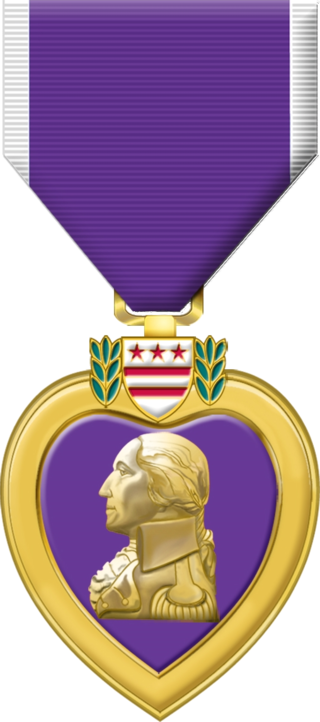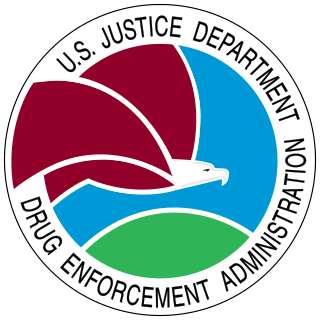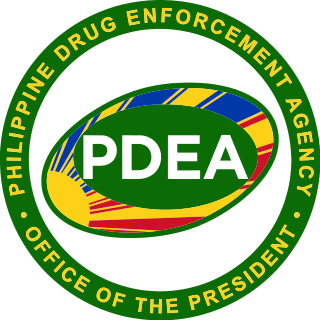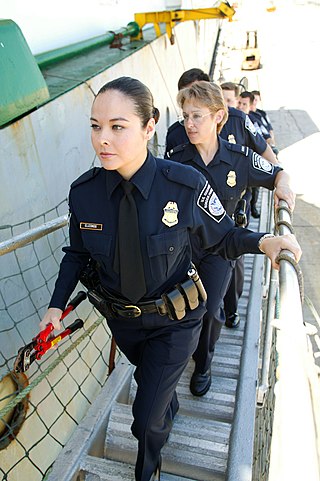
The Purple Heart (PH) is a United States military decoration awarded in the name of the president to those wounded or killed while serving, on or after 5 April 1917, with the U.S. military. With its forerunner, the Badge of Military Merit, which took the form of a heart made of purple cloth, the Purple Heart is the oldest military award still given to U.S. military members. The National Purple Heart Hall of Honor is located in New Windsor, New York.

The Drug Enforcement Administration (DEA) is a United States federal law enforcement agency under the U.S. Department of Justice tasked with combating illicit drug trafficking and distribution within the U.S. It is the lead agency for domestic enforcement of the Controlled Substances Act, sharing concurrent jurisdiction with the Federal Bureau of Investigation, the U.S. Immigration and Customs Enforcement, and U.S. Customs and Border Protection. However, the DEA has sole responsibility for coordinating and pursuing U.S. drug investigations both domestically and internationally.

Clandestine chemistry is chemistry carried out in secret, and particularly in illegal drug laboratories. Larger labs are usually run by gangs or organized crime intending to produce for distribution on the black market. Smaller labs can be run by individual chemists working clandestinely in order to synthesize smaller amounts of controlled substances or simply out of a hobbyist interest in chemistry, often because of the difficulty in ascertaining the purity of other, illegally synthesized drugs obtained on the black market. The term clandestine lab is generally used in any situation involving the production of illicit compounds, regardless of whether the facilities being used qualify as a true laboratory.

Thomas A. Constantine served as the 6th Administrator of the Drug Enforcement Administration (DEA) from March 1994 to July 1999.

The Bureau of Narcotics and Dangerous Drugs (BNDD) was a federal law enforcement agency within the United States Department of Justice with the enumerated power of investigating the consumption, trafficking, and distribution of narcotics and dangerous drugs. BNDD is the direct predecessor of the modern Drug Enforcement Administration (DEA).

United States law enforcement decorations are awarded by the police forces of the United States of America. Since the United States has a decentralized police force, with separate independent departments existing on the state and local level, there are thousands of law enforcement decorations in existence.

The Federal Bureau of Narcotics (FBN) was an agency of the United States Department of the Treasury, with the enumerated powers of pursuing crimes related to the possession, distribution, and trafficking of listed narcotics including cannabis, opium, cocaine, and their derivatives. Headquartered in Washington, D.C., the FBN carried out operations and missions around the world. The bureau was in existence from its establishment in 1930 until its dissolution in 1968. FBN is considered a predecessor to the Drug Enforcement Administration.
Grayston LeRoy Lynch was an American soldier and CIA officer. He was one of the two CIA officers who commanded the faction of the army that went to war in the Bay of Pigs Invasion. The other agent was William "Rip" Robertson.
The Narcotics Rewards Program is a program of the United States Department of State that offers rewards for information leading to the arrest and/or conviction of major international narcotics traffickers who send drugs into the United States. It was established by Congress in 1986, and as of 2021 it has paid out over $130 million in rewards leading to apprehensions.

A Law Enforcement Purple Heart or Police Purple Heart is a term to describe an American law enforcement medal which may be issued to any law enforcement officer who is injured, wounded or killed in the line of duty. The term is based on the Purple Heart medal issued by the United States Armed Forces. One of the major organizations for the Purple Heart for Law Enforcement is the National Associations of Chiefs of Police who award the Law Enforcement Purple Heart.

The Bureau of Drug Abuse Control (BDAC) was an American law enforcement agency that investigated the consumption, trafficking, and distribution of drugs and controlled substances. BDAC was a Bureau of the Food and Drug Administration (FDA). In the sum total of the two years that BDAC existed, it investigated and closed around 300 criminal cases, seized 43 clandestine drug laboratories, and made over 1,300 arrests.

The Bureau of International Narcotics and Law Enforcement Affairs (INL) is an agency that reports to the Under Secretary for Civilian Security, Democracy, and Human Rights within the United States Department of State. Under the umbrella of its general mission of developing policies and programs to combat international narcotics and crime, INL plays an important role in the training of partner nation security forces.
Meredith Thompson was a special agent in the Drug Enforcement Administration. She was killed in 1994, along with four other agents, during Operation Snowcap when her plane crashed in Peru.

The Philippine Drug Enforcement Agency is the lead anti-drug law enforcement agency, responsible for preventing, investigating and combating any dangerous drugs, controlled precursors and essential chemicals within the Philippines. The agency is tasked with the enforcement of the penal and regulatory provisions of Republic Act No. 9165, otherwise known as the Comprehensive Dangerous Drugs Act of 2002.

The federal government of the United States empowers a wide range of federal law enforcement agencies to maintain law and public order related to matters affecting the country as a whole.

The illegal drug trade in Latin America concerns primarily the production and sale of cocaine and cannabis, including the export of these banned substances to the United States and Europe. The coca cultivation is concentrated in the Andes of South America, particularly in Colombia, Peru and Bolivia; this is the world's only source region for coca.
United States v. Mendenhall, 446 U.S. 544 (1980), was a United States Supreme Court case that determined "seizure" occurs when an officer uses displays of authority to detain a person.

Enrique "Kiki" Camarena Salazar was an American intelligence officer for the Drug Enforcement Administration (DEA). In February 1985, Camarena was kidnapped by corrupt police officers hired by the Guadalajara Cartel. He was interrogated under torture and murdered. Three leaders of the cartel were eventually convicted in Mexico for Camarena's murder. The U.S. investigation into Camarena's murder led to ten more trials in Los Angeles for other Mexican nationals involved in the crime. The case continues to trouble U.S.–Mexican relations, most recently when Rafael Caro Quintero, one of the three convicted traffickers, was released from a Mexican prison in 2013. Caro Quintero again was captured by Mexican forces in July 2022.
Operation Anvil was a ninety-day pilot program conducted by the members of United States Drug Enforcement Administration (DEA)'s Foreign-deployed Advisory and Support Team (FAST) and officers from the Honduran National Police's Tactical Response Team (TRT) against drug trafficking from South America to Honduras." which began in April 2012. During the operation in 2012 there were "three deadly force incidents, on 11 May 2012, 23 June and 3 July. On 11 May DEA agents and Honduran police "killed and injured innocent civilians during the operation and ... abused residents in a nearby village." News of the incident was widely publicized. This led to a joint review by the U.S. Department of State (DOS), the U.S. Office of the Inspector General (OIG) and the U.S. Department of Justice (DOJ) of drug interdiction missions. Their 424-page report on Operation Anvil was published in May 2017.

Johnathan (Jack) E. Ingersoll was an American police officer and federal law enforcement agent. He was the first Chief of Police in Charlotte, North Carolina to use computers on the job. Ingersoll was the only Director of the Bureau of Narcotics and Dangerous Drugs (BNDD), and resigned amid the Watergate scandal. The BNDD was merged into the Drug Enforcement Administration two days after he departed from the government.














